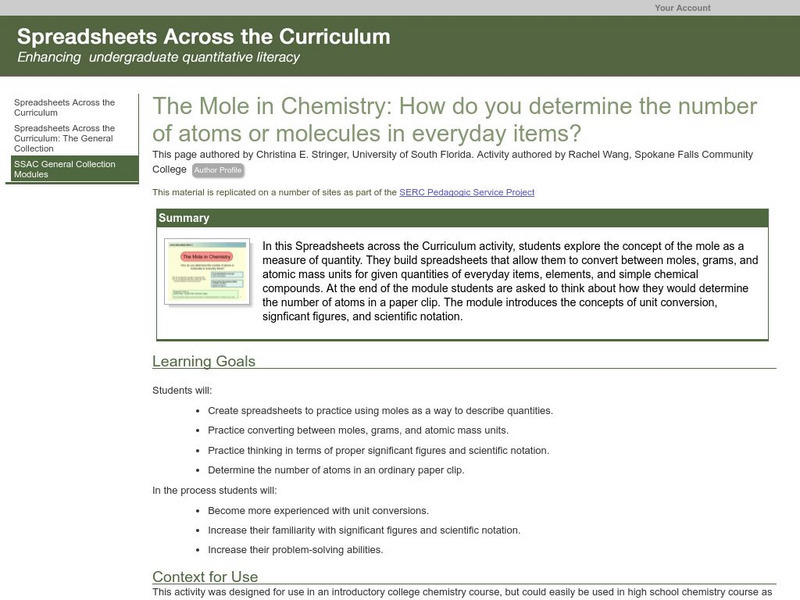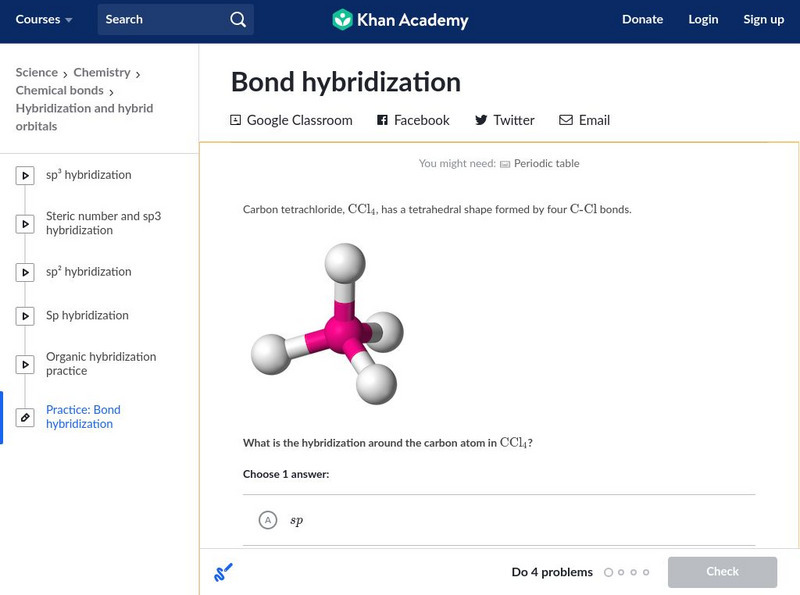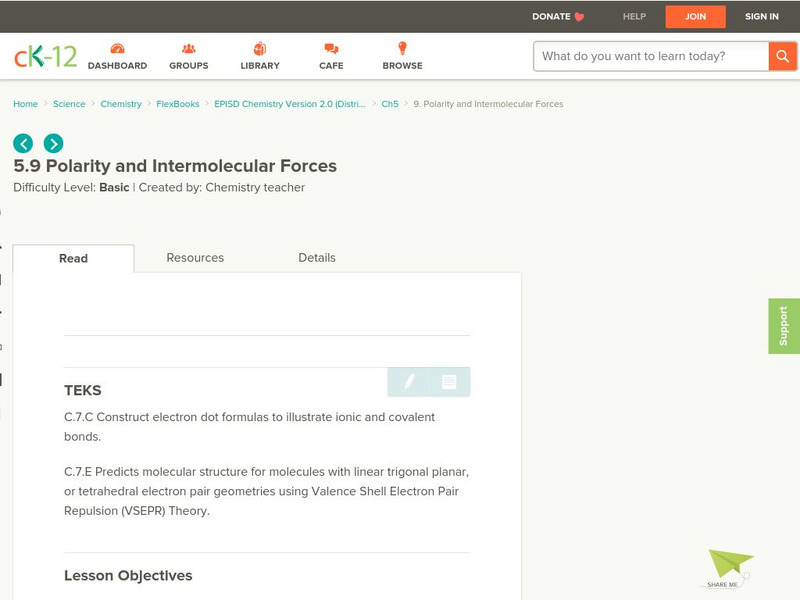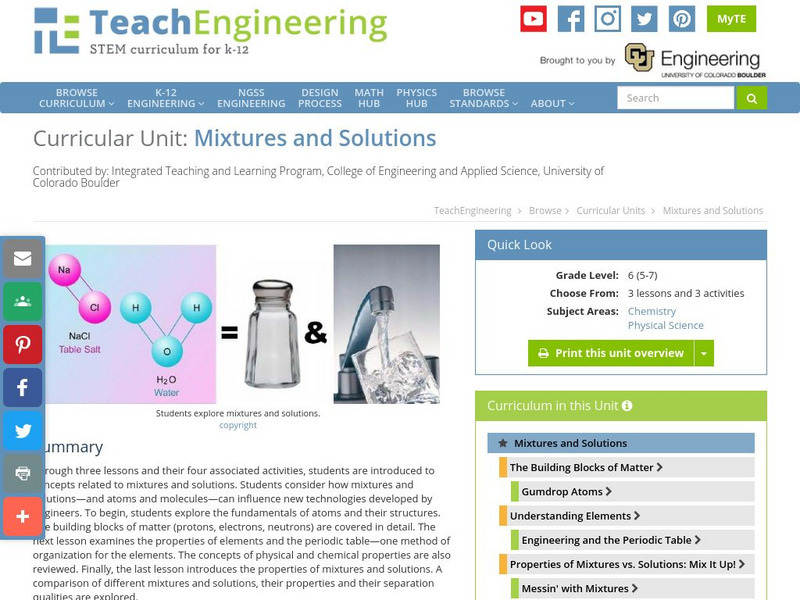Hi, what do you want to do?
Curated OER
Density, Iron, and Anemia
Students explain what factors determine density. In this physics lesson, students hypothesize which objects are less dense. They cite the importance of density in everyday life.
Curated OER
The Great Gas Race
Fourth graders improve their understanding of Graham's Law by using properties of gases to evaluate the rate of effusion of two compounds as they vaporize. They engage in a lab which elevates their understanding of the properties of gases.
Curated OER
Cell Respiration Worksheet
Beginning biologists demonstrate their grasp on cellular respiration, photosynthesis, and energy flow though ecosystems when completing this worksheet. Fifteen multiple choice and short answer questions test their knowledge. Because of...
Curated OER
Module 5 Revision Guide - Chemistry
If you use this as an outline for your chemistry lecture on metals, your young chemists will absorb a well-rounded overview. This is not a worksheet per se, but a useful summary of the behavior of metals. Save yourself some planning and...
Curated OER
Comets
Students explore the nature and composition of a comet. They research comet facts, legends, and myths. They identify different types of comets and describe what happens to a comet as it travels closer to the Sun.
Curated OER
Molecular Models Laboratory
Students use models to visualize molecular structures. Students read about Lewis dot structures, hybridization, and formal charge. Then students build and draw the molecules and ions given. Students complete 11 pre-lab questions and 4...
Curated OER
UV light & Ozone layer
Middle-school meteorologists absorb information about ultraviolet radiaton and consider the ozone layer. The book that learners are supposed to refer to is not available, so you might want to locate some graphics or posters...
Curated OER
Natural Gas Lesson-How Natural Gas Forms
Learners examine background natural gas and how it is formed and what it is made of. Titles within the series include How Natural Gas Forms, What Happens to Natural Gas when it is burned, and How Natural Gas can be used. Provides very...
Curated OER
Elements and the Periodic Table
Students are introduced to the elements on the Periodic Table and what is meant by element. Using the Table, they identify the name, atomic mass, number and symbol of each element. To end the lesson, they discover the characteristics...
Science Education Resource Center at Carleton College
Serc: The Mole in Chemistry: Determining the Number of Atoms in Everyday Items
Students explore the concept of the mole as a measure of quantity. They build spreadsheets that allow them to convert between moles, grams, and atomic mass units for given quantities of everyday items, elements, and simple chemical...
PBS
Pbs Learning Media: Chemical Bonds
This interactive activity developed for Teachers' Domain demonstrates how attractive forces between atoms create chemical bonds, resulting in the formation of molecules and compounds.
Ducksters
Ducksters: Chemistry for Kids: Naming Chemical Compounds
Learn about naming chemical compounds in chemistry including conventions, the order of the elements, metals, non-metals, acids, and examples on naming on this site.
Khan Academy
Khan Academy: Bond Hybridization
Practice determining the hybridization for atoms in covalent compounds. Use the interactive scratch pad to work out the problems.
Museum of Science
The Atom's Family: Mighty Molecules
In this activity, students construct models of molecules using marshmallows and gum drops.
Crescent Public Schools
The Internet Science Room: Chemical Formulas
This illustrated tutorial serves as a foundation for understanding chemical formulas in chemistry.
Chem Tutor
Chem Tutor: Chemistry: Compounds
This lesson focuses on chemical compounds including Ionic and Covalent Bonds, Valences, Lewis Structures, Binary Covalent Compounds, Radicals or Polyatomic Ions, and much more. It also includes a compound worksheet in which the students...
National Institutes of Health
Ncbi: The Molecular Biology of the Cell: The Chemical Components of a Cell
Advanced chapter of the book "The Molecular Biology of the Cell" describes and provides illustrations of our most current understanding of the chemical makeup of cells and their components. Explains in detail how electron activity keeps...
Khan Academy
Khan Academy: Bond Hybridization
Practice determining the hybridization for atoms in covalent compounds.
CK-12 Foundation
Ck 12: Polarity and Intermolecular Forces
[Free Registration/Login may be required to access all resource tools.] The following online tutorial describes how the electronegativity difference between two atoms in a covalent bond results in the formation of a nonpolar covalent,...
TeachEngineering
Teach Engineering: Mixtures and Solutions
This unit covers introductory concepts of mixtures and solutions. Students think about how mixtures and solutions, and atoms and molecules can influence new technologies developed by engineers. The first lesson explores the fundamentals...
BBC
Bbc: Gcse Bitesize: Bonding: Covalent Bonds
This section of the lesson module focuses on covalent bonds, which are formed between non-metal atoms that share a pair of electrons. It includes links to a video and a test. Other types of chemical bonds are covered elsewhere in the...
Educaplus (Jesús Peñas Cano)
Educaplus: Enlace Ionico [In Spanish]
Expand your knowledge of Chemistry. Observe how ionic compounds are networks of electrically charged atoms.
McREL International
Mc Rel: Glue Polymer (Whelmer #15 Learning Activity)
An easy to do activity that investigates the basic principles behind chemical bonding. The activity is written in lesson plan format that meets NSES standards.
Other
Science Alive: Synthetic vs. Natural: What's the Difference?
Through this reading, students will learn that a substance's properties arise from its molecular structure, not from how it's made (i.e., synthesized by people or found in nature). There is no fundamental difference between natural and...






















![Educaplus: Enlace Ionico [In Spanish] Activity Educaplus: Enlace Ionico [In Spanish] Activity](https://content.lessonplanet.com/knovation/original/371949-76073a684ee4c0d8b8f98ca59436f253.jpg?1661809839)